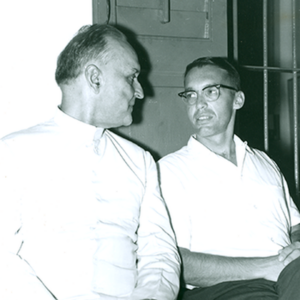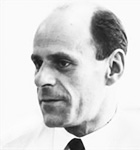 Kindred spirits who they helped shape the early years of the Peace Corps
Kindred spirits who they helped shape the early years of the Peace Corps
By Bill Josephson
Pictured: Dr. Mahmud Hussain, vice chancellor of Dacca University — one of the host institutions for Peace Corps Volunteers serving in East Pakistan since October 1961 — chats with Peace Corps Representative to Pakistan F. Kingston Berlew of Washington, DC. Photo courtesy Peace Corps
F. Kingston Berlew, a distinguished lawyer, walked into my Peace Corps General Counsel’s office unannounced in 1961 and said that he wanted to join the Peace Corps. He had a wife and children; service as a Volunteer was out.
King sailed through the talent search with flying colors and went to Pakistan — East and West at that time — as the first Peace Corps director there. We were kindred spirits, and at his request, I conducted the close of service conferences for Pakistan I in both Dhaka and Lahore.
King then became associate Peace Corps director in charge of selection, training, and overseas support. He later led a career in international business and law and founded the World Law Group, today a network of 21,000 lawyers representing firms in 89 nations. He died in February 2021 at age 90. His brother, David Berlew, was the third Peace Corps director in Ethiopia.
 Murray Frank was also a kindred spirit. In the early days of the Peace Corps, the Federal Bureau of Investigation conducted full-field investigations of all staff, domestic and foreign. Sarge decided that the Peace Corps should not have an identifiable security office. The task of reviewing investigations that raised issues fell to the general counsel’s office, as did liaison with other intelligence and law enforcement agencies. In Murray’s field, the identified “red flags” were numerous, generally unintended and inconsequential.
Murray Frank was also a kindred spirit. In the early days of the Peace Corps, the Federal Bureau of Investigation conducted full-field investigations of all staff, domestic and foreign. Sarge decided that the Peace Corps should not have an identifiable security office. The task of reviewing investigations that raised issues fell to the general counsel’s office, as did liaison with other intelligence and law enforcement agencies. In Murray’s field, the identified “red flags” were numerous, generally unintended and inconsequential.
Murray began serving as a field associate Peace Corps director beginning with Nigeria I and was there for three years. He often said it was the most exciting time of his life. He distinguished himself by his concern for and rapport with the Volunteers.
He was born in 1927 and served in the Pacific during World War II; he went to New York University on the GI Bill. In 1965 he joined the Selma to Montgomery march for voting rights. His long and distinguished career included serving as dean of the College of Public and Community Service and as a fellow of the McCormack Institute at the University of Massachusetts, Boston. We remained close throughout his life, talking on the telephone just a few weeks before he died in January at age 93.
This story appears in the 60th-anniversary edition of WorldView magazine.
Story updated January 17, 2022.
Bill Josephson is the Founding Counsel for the Peace Corps and is co-author of the memorandum “The Towering Task,” which laid out the architecture of the Peace Corps. Read his conversation with Bill Moyers, Joe Kennedy III, and Marieme Foote about the establishment of the Peace Corps in the 60th-anniversary edition of WorldView magazine as well.